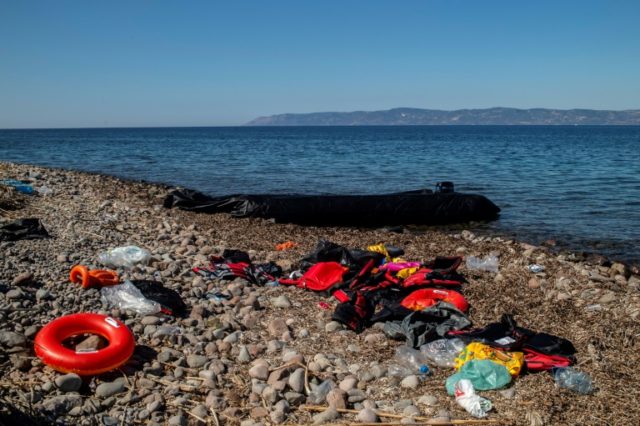Skála Sykaminéas (Greece) (AFP) – Fisherman Christos Halkiotis in the village of Skala on the Greek island of Lesbos gives short shrift to a promised Greek government crackdown to curb rising migration flows.
“It’s all up to the Turks,” said Halkiotis, calmly unspooling his lines and hooks in a bucket. “They’re the ones letting them through.”
Halkiotis, a young-looking 67, spoke with the voice of someone who had heard the same promises before.
“This has been happening here for 30 years,” he said with a shrug.
Lesbos is at the forefront of refugee and migrant arrivals from Turkey, one of five Greek islands in the Aegean sitting just off the Turkish coast.
They are bearing the brunt of the arrivals from Turkey, with more than 26,000 people in the camps across the islands.
The camp of Moria, on Lesbos, has half of them: 13,000 people crammed in a space designed for just 3,000 encapsulates the hardship they endure.
Accidents and violence are common in the unhygienic camp, and on Sunday, a fire killed a woman there, sparking brief rioting.
A day later, the government vowed to return 10,000 migrants who fail asylum requirements to Turkey by the end of 2020.
In four and a half years under the previous left-wing government, Turkey took back fewer than 2,000 people.
Not everyone is impressed however.
– ‘New arrangement’ needed –
“I don’t think it will work,” said Dimitrios Karagiannis, a Skala pensioner.
“The Turks will always do what they want, no matter what Greece or Europe may want,” said the 82-year-old.
“You can give them a sackful of money … in six months to a year, they’ll be doing the same,” he told AFP.
The conservative government of Prime Minister Kyriakos Mitsotakis, elected in July, has already announced more naval patrols in the Aegean, closed centres for migrants refused asylum, and plans to overhaul the asylum system.
But Karagiannis observed: “No matter how many patrols you put, it’s the sea.”
Turkish President Recep Tayyip Erdogan has called for international partners to give more money to help his country support the more than 3.6 million Syrian refugees there.
Failing that, he has threatened to allow larger numbers of refugees to cross the Aegean — a perilous voyage that claims hundreds of lives annually.
More than 60 people have perished so far this year attempting the crossing in the Eastern Mediterranean, according to the International Organization for Migration (IOM).
Mitsotakis, after meeting Erdogan in New York last week, urged the European Union to commit more money to Turkey.
“It’s very clear to me that we need a new arrangement,” said Mitsotakis, referring back to the 2016 deal in which the EU committed six billion euros ($6.6 billion) in return for Turkey stopping migrants from crossing.
“Turkey needs to make commitments to maintain this arrangement and the European Union needs to acknowledge that Turkey is hosting millions of refugees and needs to provide additional financial support to Turkey going beyond 2019,” he told Greek journalists.
Mitsotakis insists that most new arrivals to Greece are “economic migrants” from Afghanistan or sub-Saharan Africa rather than refugees from war-ravaged Syria.
He too wants more support from other EU members, saying it was “deeply unfair” that other EU member states have refused to contribute or resettle refugees.

COMMENTS
Please let us know if you're having issues with commenting.